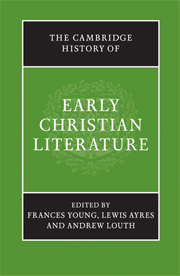Book contents
- Frontmatter
- PART ONE The Beginnings: The New Testament to Irenaeus
- A LITERARY GUIDE
- 1 Introduction: the literary culture of the earliest christianity
- 2 The apostolic and sub-apostolic writings: the New Testament and the Apostolic Fathers
- 3 Gnostic literature
- 4 Apocryphal writings and Acts of the martyrs
- 5 The Apologists
- 6 Irenaeus of Lyon
- B CONTEXT AND INTERPRETATION
- PART TWO THE THIRD CENTURY
- PART THREE FOUNDATION OF A NEW CULTURE: FROM DIOCLETIAN TO CYRIL
- Bibliographies
- Index
- Map: The Roman Empire in the late fourth century AD"
- References
3 - Gnostic literature
from A - LITERARY GUIDE
Published online by Cambridge University Press: 28 March 2008
- Frontmatter
- PART ONE The Beginnings: The New Testament to Irenaeus
- A LITERARY GUIDE
- 1 Introduction: the literary culture of the earliest christianity
- 2 The apostolic and sub-apostolic writings: the New Testament and the Apostolic Fathers
- 3 Gnostic literature
- 4 Apocryphal writings and Acts of the martyrs
- 5 The Apologists
- 6 Irenaeus of Lyon
- B CONTEXT AND INTERPRETATION
- PART TWO THE THIRD CENTURY
- PART THREE FOUNDATION OF A NEW CULTURE: FROM DIOCLETIAN TO CYRIL
- Bibliographies
- Index
- Map: The Roman Empire in the late fourth century AD"
- References
Summary
‘Gnosticism’ and ‘gnostic’ are not easy terms to define. Traditionally, they were used to describe certain second- and third-century Christian groups or teachers that claimed to possess a special saving knowledge (γνωσις), which had been revealed to their predecessors and passed on to them. Such persons, we learn, described themselves, using Pauline language, as ‘spiritual’ or ‘perfect’, and sometimes perhaps as ‘gnostics’ (possessors of a life-giving awareness). This knowledge could not be received by everyone: it was an esoteric knowledge destined only for the elect. Christians who received and accepted it seem to have thought of it as the real or ‘deep’ meaning of ordinary Christian teaching, which, therefore, they appeared to affirm on one level and to deny on another. It was this circumstance, with the differences of belief and behaviour that accompanied it, that made these gnostics seem at once puzzling, threatening, and alien – and not least because for Christian communities, already hard pressed to survive in an increasingly hostile world, cohesiveness was not only a virtue but a necessity.
This traditional understanding of gnosticism as a deviant form of Christianity – a heresy or assemblage of heresies – is consistent with the character of the literary sources from which knowledge of it was drawn. These sources were the reports of gnosticism’s dedicated Christian opponents. In some cases, they quoted passages from the writings of gnostic thinkers. Clement of Alexandria, perhaps the mildest of gnosticism’s detractors, preserves in his Stromateis (Miscellanies) bits of the writings of Valentinus and Basilides. In his Excerpts from Theodotus, he muses critically over the ideas of a later Valentinian author.
- Type
- Chapter
- Information
- The Cambridge History of Early Christian Literature , pp. 20 - 27Publisher: Cambridge University PressPrint publication year: 2004



